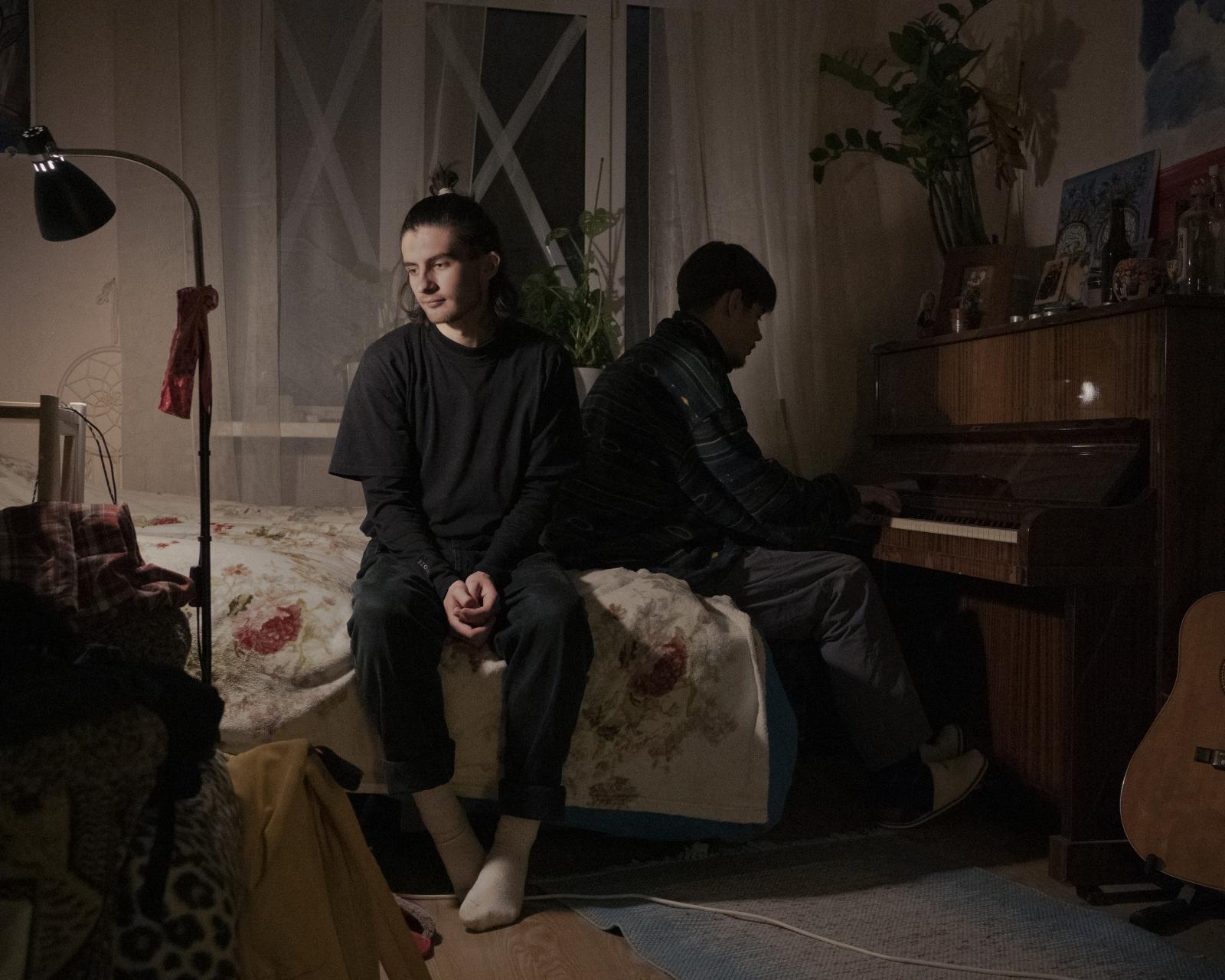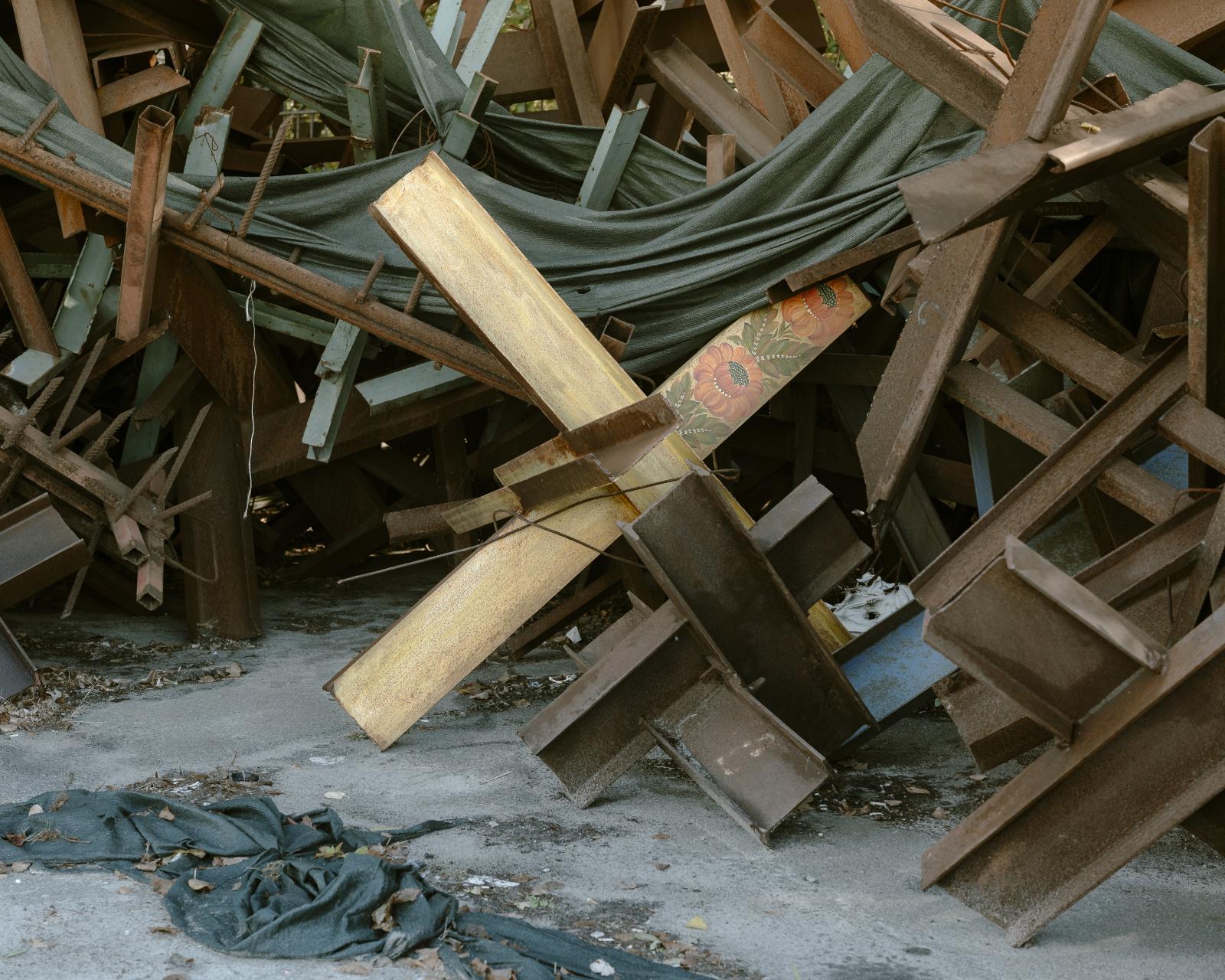Yehor H., 20 years old. Kyiv, December 2022
“Before autumn, the impact of war on my life was primarily characterized by the constant fear of air sirens and missiles, but now it affects me on a daily basis, especially during power outages when I return to my dark and cold apartment. Lying under the blanket becomes a way to shield myself from overwhelming feelings of emptiness and loneliness. My depressive episode got worse, leaving me without the strength to get out of bed. The news from my hometown, where my mom and grandma currently reside, has worsened, with Russian missiles posing an increasing threat. At times, I find myself just sitting on my bed, contemplating if I can endure it any longer. I yearn for it all to stop. I don't know if it's connected to my identity as a gay person, but during the war, I sensed a heightened pressure to conform to traditional notions of masculinity, that I should be a manly man that protects his family and friends. But I’m not.”
The place where we are - must not be named, must not be recognizable in any of the photos. It is one of many so-called „stabilization points“ of the Ukrainian armed forces here in the east of the country. Places where time sometimes stands still. And where minutes can turn into hours. The soldiers are first treated here before they can be taken to a hospital. Sometimes they suffer of minor war injuries, such as graze wounds. But often larger ones, such as blown-off legs. Then the paramedic's work is a matter of life or death.
Petro Zlotia is just 23 years old and spent his birthday here last September. He used to live in Odessa when the Russian invasion began. „When I saw what was happening in Butcha, I just had to go. I have a little sister. I wanted to protect her.“ For this reason, he joined the army in March 2022. When asked if he regrets it, he says no - but of course he often thinks back to the time before.
Between the air alarms and daily life, Mino Chumachenko (18) tries to enjoy the calm, watching as a transformer station passes by the window of the Kyiv bus he's on. Today, shortly after Ukraine’s 33rd Independence Day, Russia fired several hundred drones and missiles all over the country. Including the capital. In the morning, explosions shook Kyiv.
Two years ago, Chumachenko lived in the city of Kherson in the south of Ukraine. Under Russian occupation, he hardly dared to leave his house. The fear of the invaders was too great, as Mino Chumachenko is trans and a member of the LGBTQ community.
Oleksiy Polukhin (left), 22 years old, is an LGBT* activist from southern Ukraine. He was arrested at a military checkpoint of the Russian occupying forces in Kherson -because he was a member of an LGBT* telegram group and was accused of sharing information with the Ukranian military. The occupying forces held him in one of the torture prisons for over two months where he was humiliated and exposed to severe violence. Among other things, they allegedly forced him to dance in a woman‘s dress when they found out that he had earlier performed as a drag queen.
“They probably did that to make fun of me,” he says. Oleksiy is still hunted by nightmares and struggles with flashbacks of his captivity during daytime. His partner tries to help him to come to terms with these experiences. He is not the only victim of this praxis. More cases like this are documented by the Projector organization and have already been assigned to local, national and international courts. A particular concern of Oleksiy Polukhin and other victims is that the acts are recognized in court as gender-specific hate crimes against the LGBTIQ community. Eight Russian military officers who were allegedly involved in Polukhin‘s abuse have been charged. They face up to twelve years in prison.
Sasha N, 22 years old. Lviv, December 2022
"I worry about queer people in Ukraine, because, to me, it feels like a small family, and we all have to support each other. Especially during the war, LGBTQI+ individuals have emerged as a significant source of strength for both LGBTQI+ civilians and the military. LGBTQI+ organizations find humanitarian aid for LGBTQI+ refugees, establish shelters, and organize psychological support groups. I am most worried about the members of the LGBTQI+ community who are fighting or volunteering in hot spots, because if someone dies or is injured, their partners lack any legal rights to burial, inheritance, or hospital visitation. Additionally, I feel a sense of insecurity due to persistent manifestations of homophobia and intolerance. However, there is a glimmer of hope as the percentage of tolerant individuals has increased slightly, and the government has taken some steps to support the queer community.”
Sasha N., 21 years old. Lviv, December 2022
“Everything has changed. I’ve stopped planning my next day. I now truly cherish light, warmth, connections, my friends, my family, and my job. The war has changed everything, yet it has also revealed the most important things in the world to me. Amid the struggles brought by the war, such as depression, anxiety, and PTSD, I personally have experienced and continue to grapple with PTSD. I believe nearly every Ukrainian is facing some form of mental challenge due to the war. It may sound unconventional, but finding joy in life has become of utmost importance. Whether it’s a day following a barrage of 100 missiles in Ukraine, or an evening lit by candles with hot tea and blankets after enduring three days without heat—these simple moments have taken on great significance.”
Edward R, 37 years old. Kyiv, December 2022
“I would like to continue my transition, but now it’s impossible. I don’t want to rely on Hormone Replacement Therapy when hormones might become inaccessible. I’m scared to change my documents now, as it would require spending around one month without a valid passport. In times where there is a constant risk of danger or death, having valid documents is crucial. This, for me, is the primary challenge of being trans* in this war.”
Yeva Lotta Y, 19 years old. Lviv, March 2022
“Putin‘s occupation of our territories would mean not only the loss of the land itself but the forfeiture of everything we hold dear as a nation, first and foremost our freedom. I see no reason to continue living without my freedom, as most Russians do. I don’t want anyone else to dictate decisions for me. I want to make them myself. I want to create enough space for myself to do the things I like to do. And I want to have enough space to fight for the things I want.”
Alexander Demenko remembers sitting at the wheel of the car, headingtowards Mariupol. It was the beginning of the invasion and he could no longer organize his thoughts. “I just drove, always straight ahead,” he says. It was all about coordinating, functioning, overcoming the shock. - The battle for Mariupol went on for days, and in the end the last units of Ukraine ended up in the Asov steelworks.Surrounded by Russian troops with nowhere to escape. Demenko was already injured at this point. Now, three years later, we are sitting in his apartment in Kyiv. A high-rise building, modernly furnished, a glittering wallpaper adorns the wall. He pulls up his T-shirt, small scars appear on his back. Where metal splinters from an explosion had drilled into his skin.
„We hardly had any contact with the outside world, we could only send messages sometimes. I wrote to my mother: ‚Mom, don‘t worry about me, but can you please look after my partner?‘” That was the moment his family found out, what he had kept secret for a long time. He is gay. Today he says: “If I die, I will die as a gay man - and if I survive, I won‘t hide it anymore.” Like the others in Mariupol, Demenko was takenprisoner of war by Russia - and returned through an exchange.






























